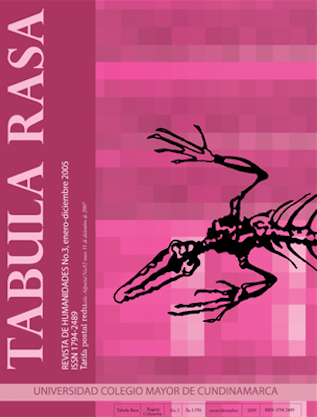«Bailando como negro»: ritmo, raza y nación en Esmeraldas, Ecuador
«Dancing like a Black Man». Rythm, Race, and Nation in Esmeraldas, Ecuador
Mostrar biografía de los autores
Por toda la diáspora Africana, «ser negro» ha sido asociado con la habilidad de bailar rítmicamente. Esta asociación muchas veces es naturalizada en discursos populares que sugieren que las personas negras tienen un sentido de ritmo innato—que llevan el ritmo «en la sangre». Esta caracterización es a veces apropiada por individuos que se auto-identifican como negros, y los cuales consideran sus habilidades de baile como parte importante de su identidad racial incorporada. Estas representaciones de raza son una fuerza poderosa para formar relaciones sociales y por lo tanto es esencial entender como son reproducidas y hechas significantes en la vida diaria. Este artículo intenta de hacer eso mismo, analizando el enlace naturalizado entre raza y ritmo en el caso de Esmeraldas, Ecuador. Utilizando material detallado etnográfico de esta ciudad, se enfatiza los procesos cambiantes, muchas veces ambiguos, de identificación racial. Se cuestionan detalladamente las relaciones entre cuerpos y discurso, y se resalta el significado de contextos sociales y políticos particulares en la construcción de diferencias raciales.
Visitas del artículo 1617 | Visitas PDF 119
Descargas
Abric, J. 1993. «Central system, peripheral system: their functions and roles in the dynamic of social representations», en http://www.swp.uni-linz.ac.at/content/index.htm
Augostinos, M. y I. Walker. 1995. Social Cognition, An Integrated Introduction. Londres, Sage Publications.
Chambers, Iain. 1986. Popular Culture: The metropolitan experience. London/New York, Methuen. Cowan, Jane K. 1990. Dance and the Body Politics in Northern Greece. Princeton, Princeton University Press.
Cox, Rupert A. 2003. The Zen Arts: An anthropological study of the culture of aesthetic form in Japan. London/New York, Routledge Curzon.
de la Torre, Carlos. 2002. Afroquiteños: Ciudadanía y Racismo. Quito, CAAP.
Foster, Susan Leigh. 1992. Dancing Bodies.’ Incorporations, edited by Jonathan Crary and Sanford Kwinter. New York, Zone.
Hall, Stuart. 1996. «What is This “Black” in Black Popular Culture?» Stuart Hall: Critical Dialogues in Cultural Studies, edited by David Morley and Kuan-Hsing Chen. London/New York, Routledge.
Mauss, Marcel. (1934) 1992. Techniques of the Body. Incorporations, edited by Jonathan Crary and Sanford Kwinter. New York, Zone.
Rahier, Jean Muteba. 1998. «Blackness, The Racial/Spatial Order, Migrations and Miss Ecuador 1995-96». American Anthropologist 100 (2):421-430.
Sansone, Livio. 2003. Blackness Without Ethnicity: Constructing race in Brazil. New York, Palgrave Macmillan
Savigliano, Marta E. 1995. Tango and the Political Economy of Passion. Boulder/San Francisco/ Oxford, Westview Press.
Shilling, Chris. 1993. The Body and Social Theory. London, Sage.
Stoler, Ann Laura. 2002. Carnal Knowledge and Imperial Power. Berkeley/Los Angeles/London,University of California Press.
Stutzman, Ronald. 1981. «El Mestizaje: An all-inclusive ideology of exclusion». In Cultural Transformations and Ethnicity in Modern Ecuador, edited by Norman E. Whitten. Illinois, University of Illinois.
Taussig, Michael. 1987. Shamanism, Colonialism and the Wild Man: A study in terror and healing.Chicago/London, University of Chicago Press.
Turner, Bryan S. 1984. The Body and Society: Explorations in social theory. Oxford: Blackwell.
Wade, Peter. 2002. Race, Nature and Culture: An anthropological perspective. London, Pluto Press.
Wade, Peter. 2000. Music, Race, and Nation: Música tropical in Colombia. Chicago/London, The University of Chicago Press.
Wade, Peter. 1999. «Working Culture: Making cultural identities in Cali, Colombia». Current Anthropology 40(4):449-471.
Whitten, Norman E. (1974) 1994. Black Frontiersmen: Afro-Hispanic culture of Ecuador and Colombia. Prospect Heights, Illinois: Waveland Press.




